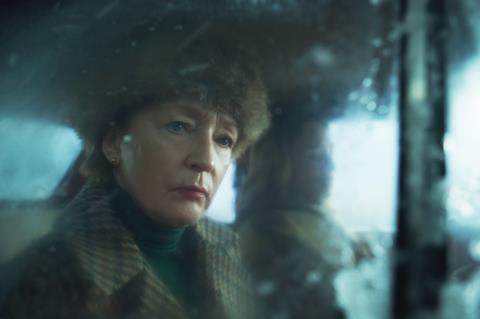The British star captivates as a professor on a deadly trip to 1980s Warsaw in Kasia Adamik’s gritty drama

Dir: Kasia Adamik. Poland/Luxembourg/UK. 2025. 112mins.
Lesley Manville joins the burgeoning ranks of 60-something accidental heroes in Kasia Adamik’s tense thriller, putting in a tightly wound and compelling performance even if the film’s momentum occasionally sags. She plays psychiatry professor Dr Joan Andrews, as bright and brittle as an icicle, who becomes caught up in Poland’s instigation of martial law on December 13, 1981.
The action sequences play out with grounded verve
Inspired by the short story Professor Andrews In Warsaw by Nobel prize winner Olga Tokarczuk, Adamik and her co-writers Sandra Buchta and Lucinda Coxon add a Cold War spy thriller layer to what is essentially a character study. They also help freshen the familiar plot beats by flipping the gender of the novel’s eponymous protagonist. Executive produced by Adamik’s mother, filmmaker Agnieszka Holland, among others, Winter of the Crow premieres in Toronto’s Platform strand before making its European bow as the closing film of San Sebastian film festival. While not breaking new narrative ground, its pace, gritty Bourne Identity-style approach and Manville’s gripping turn give it plenty of mainstream appeal.
A slightly rushed set-up sees Joan take a rare opportunity to speak about her work in Warsaw. Flying to Poland, she is greeted by young student Alina (Zofia Wichlacz), but not her luggage – an absence that immediately gives a sense of slippage to the good doctor’s carefully calibrated world. The fish-out-of-water sensation is heightened by the deliberately murky cinematography from Tomasz Naumiuk, which renders Warsaw as a city of slushy, smudgy brutalism where frosty exteriors and clammy interiors offer little comfort.
It’s a place where, in Joan’s mind, reality begins to blur with her recurrent nightmare about running along endless narrow passages unable to escape. The crows of the title are also a repeated motif, their significance two-fold: the junta’s Military Council of National Salvation was abbreviated to WRON and its similarity to “wrona”, the Polish word for crow, used to generate jokes by the regime’s critics.
Joan’s lecture also doesn’t go as planned, as it is quickly ambushed by student activists and, later, she finds herself staying not at the hotel she imagined but an ageing apartment block. Her sympathy for Alina’s cause is minimal, an aloof outsider’s perspective that will gradually be eroded over the course of her trip. The sense of her being one step removed from those around her is emphasised by her use of a Polaroid instamatic camera, a preference for seeing the world through a lens that will come home to roost.
The next morning, while Alina is away with Joan’s passport in an attempt to retrieve her luggage, the film kicks into gear as martial law is declared, the country shuts down and the professor finds herself stranded without papers – and with photographic witness to a murder by the regime. Manville comes into her own as Joan tries to escape a world in which she struggles to communictae, letting the professor’s dawning awareness of the regime’s grip flicker through her performance.
Adamik has tackled thrillers before with the likes of Spoor (co-directed with Holland) and Amok, but here she takes a leaner approach that pays dividends – not least in the action sequences, which play out with grounded verve. It’s not speed but claustrophobia that is the chief mood of a car chase, for example, allowing Manville’s reaction to what is happening dominate.
The sensation of nowhere being safe mushrooms throughout the film, so that even a light in the wrong place at the wrong time feels like a tinder box. When Joan finds herself having to fight back, the action remains plausible because, like Emma Thompson’s character in the recent The Dead of Winter, she has been well established as both resourceful and increasingly desperate.
Although the impetus slackens briefly, a last act encounter with the British ambassador (Tom Burke, making a small part enjoyably ambiguous) offers a satisfying crescendo to Joan’s shift from being bystander to participant, and brings the action right back up to speed as Adamik sends it hurtling towards a nerve-shredding finale.
Production companies: Wild Mouse Production, Film Produkcja, Iris Productions, Film and Music Entertainment Ltd
International sales: HanWay Films, tj@hanwayfilms.com
Producers: Olga Chajdas and Stanisław Dziedzic, Katarzyna Ozga, Nicolas Steil, Samantha Taylor
Screenplay: Sandra Buchta, Kasia Adamik, Lucinda Coxon, inspired by the short story Professor Andrews In Warsaw by Olga Tokarczuk
Cinematography: Tomasz Naumiuk
Production design: Aleksandra Kierzkowska
Editing: Andonis Trattos
Music: Emre Sevindik
Main cast: Lesley Manville, Zofia Wichlacz, Andrzej Konopka, Sascha Ley, Tom Burke, Magdalena Smalara, Miron Jagniewski, Jakub Guszkowski















![[L-R]: Amanda Villavieja, Laia Casanovas, Yasmina Praderas](https://d1nslcd7m2225b.cloudfront.net/Pictures/274x183/6/4/1/1471641_pxl_20251224_103354743_618426_crop.jpg)








